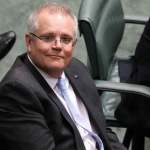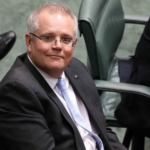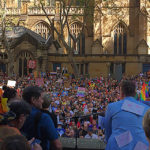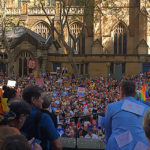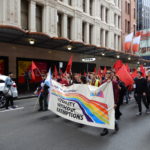Latham Is Now Championing Morrison’s Religious Prejudice Crusade in NSW

“The fastest growing form of discrimination in our society is against people of religious faith, especially Christians,” said NSW One Nation MLC Mark Latham in a baffling second reading speech on his recently introduced religious freedoms legislation.
The NSW leader of Pauline Hanson’s party goes on to make the case that “selective diversity policies have been introduced” that have led to the inclusion of “every letter of the alphabet except C and H”, by which he means Christians and heterosexuals.
Indeed, not since the current PM started banging the religious freedoms drum around the time same-sex marriage laws were passed, has someone come out with such a blatant argument to undermine the framework of anti-discrimination laws that have been built up since the 1970s.
As social justice advocate Father Rod Bower remarked last August, “There’s no evidence of any sort of widespread discrimination against people of faith.” And to claim that majority heterosexuals have been undermined by extending the civil right to marry to LGBTIQ people, just doesn’t add up.
The fact that One Nation is pushing religious freedoms in this state doesn’t reflect well on Morrison’s federal crusade either, as since its inception in the mid-90s, Pauline Hanson’s party has been about championing campaigns that are anti-Muslim, anti-Asian, anti-LGBTIQ and anti-First Nations.
Privileging religion
Latham introduced the Anti-Discrimination Amendment (Religious Freedoms and Equality) Bill 2020 (NSW) on 13 May, claiming there’s no need to wait for the federal Religious Discrimination Bill 2019 (Cth) to be passed first, as the attorney general has indicated it won’t override state laws.
NSW Council for Civil Liberties (NSWCCL) human rights convenor Dr Lesley Lynch asserts the bill shouldn’t proceed, as “it would be sensible to achieve national consistency in anti-discrimination legislation” and therefore, it should wait for the federal bills to be reactivated.
“There’s a problem with developing religious discrimination laws in isolation in that the implications of provisions for the exercise of other co-equal rights are obscured and remain untested,” the doctor explained. And “even without any deliberate bias”, unintentional discriminatory outcomes can arise.
Dr Lynch said she was disturbed by Latham’s assertions about Christians and heterosexuals being underrepresented in the public eye.
“Latham argues that discrimination against Christians is urgent and significant in NSW. It isn’t,” she added. “There have been a couple of very public controversies, but it’s just not the case that discrimination against Christians in NSW is a significant issue.”
During his speech, Latham cited Rugby Australia’s condemnation of Israel Folau for posting harmful comments about gay people and Tennis Australia’s rejection of Margaret Court’s stance on same-sex marriage, as evidence that Christians are being targeted.
The bill has a “tendency to over-privilege religious discrimination,” Dr Lynch told Sydney Criminal Lawyers. “It does this by building in a range of ‘exceptions’ which would allow religious believers to discriminate against others lawfully.”
“Real, full-on, genuine, 100 percent inclusion”
Latham’s bill seeks to insert new part 2B into the Anti-Discrimination Act 1977 (NSW) (the Act). Proposed section 22KB maintains that for the purposes of the Act a religious belief or activity is one that a person holds or engages in or is thought to hold or engage in, in the past, present or future.
New section 22L outlines that a perpetrator discriminates against an aggrieved person if they are treated differently or required to do something differently because of their religious beliefs or activities or because of the beliefs or activities of a relative or associate.
The legislation goes on to outlaw these forms of discrimination in relation to education, the provision of goods and services, accommodation, clubs, programs and all forms of employment.
However, when it comes to employment and education, the bill provides exceptions for religions.
That’s exceptions, not exemptions
But, the real clincher in Latham’s bill is proposed section 22M of the Act, which outlines that religious ethos organisations do not discriminate against another person on the basis of their religious belief or activities if it engages in conduct consistent or required by its own faith.
This includes a religious ethos organisation giving preference to someone from its own faith as well.
The legislation defines a religious ethos organisation as either a private educational authority, a charity or any other body “that is conducted in accordance with the doctrines, tenets, beliefs or teachings of a particular religion”.
“Currently, under anti-discrimination law religious bodies are granted exemptions in their employment and other administrative practices, as if they have done something wrong to minority groups in society,” Latham posits in his speech.
The former federal Labor leader goes on to suggest that state laws that grant exemptions to religious bodies and charities treat these organisations as “second-class citizens”.
An example are the exemptions provided under the Anti-Discrimination Act that allow private educational authorities, which include religious schools, to discriminate against employees and students based on them being homosexual or transgender.
“My bill corrects this imbalance,” Latham goes on. “It treats religion as an equality right no less deserving, no less legitimate, no less equal than any other human right. The bill has exceptions to discrimination law, not exemptions.”
No flag for Mark 🙁
During his second reading speech on the bill, the NSW One Nation leader laments that there is no flag, network, or special ceremony to affirm and celebrate the identity of Christian and heterosexual people.
However, one must wonder whether Latham realises that when he enters NSW parliament the overwhelming majority of state lawmakers are Anglo Australian heterosexual men, just like him.
And while Latham may be an atheist, it is the Christian Lord’s Prayer that is recited at the opening of any session of parliament.
These set of circumstances do make a difference in terms of privilege and power in this state. And this might be the reason why Latham’s religious freedoms bill is up for parliamentary review, whereas so many other private members bills fall by the wayside.
So, Latham’s religious freedoms move could certainly be read as simply another white male spitting the dummy about having to make a bit more room at the table.
Although, according to the member’s logic, the framework of state anti-discrimination laws wouldn’t permit a white heterosexual male, like himself, the privilege to be able to do that.


